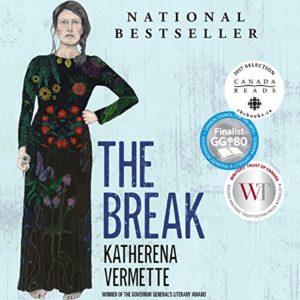
Credit to Amazon.ca for this image, and for choosing The Break for their Best First Novel Award — but buying from a local bricks’n’mortar bookstore is a virtue.
[7-minute read]
I grew up next to the Six Nations of the Grand River, played hockey and ball with guys off the Rez and then came high school. All the “upper-ender” kids came to Caledonia High School, so I was in class with them and added Native teammates and friends via football and basketball. (Phys. Ed. efforts with the webbed stick told me I was way too far behind to even try to play lacrosse with the Porters and Logans and Thomases.) Had we known the term, I might have described myself as “woke” when it came to an understanding of, and empathy and affection for, Indigenous people. I would have been wrong, of course.
Travelling across Canada after graduation, I got off a bus at the Winnipeg terminal in 1977 and didn’t know where I was. This is Canada? I was 19. My tenderfoot experience hadn’t prepared me: this was an assault to the senses and my small-town sensibilities, a sudden exposure to realities that most non-Indigenous Canucks, more or less actively, ignore or suppress. At the simplest level, it was the first time in my life where *I* was the ethnic minority, and my skin tone also made me (or my pockets, which were far from deep at the time) a target for desperate panhandlers. It was a pathetic carnival of faces ravaged by addiction, poverty, listlessness, need and other forms of oppression. My first grim sight of Winnipeg looked like a war zone, minus the helmets and artillery.
I was a young white Canadian. I had a lot to learn.
I still do.
Katherena Vermette’s The Break, set in Winnipeg’s North End, could be called my most recent bit of instruction if that didn’t insult the art of the thing. I was a little slow to that party, too, three years after this startlingly strong first novel made a national splash on Canada Reads. (Disclosure: three years late in getting to a novel is pretty good for me. Though a CBC Radio devotee, a part-time lit-wit and former English Creature, I haven’t paid sufficient attention to CR, and now, like so much of what we took for granted, it’s semi-cancelled.) But that makes it a perfect candidate for my Better Read Than Never series. Hurray.
The Old Smiling White Guys Book Club (not its real name) that I tag along with has been a delight. It pushes us to read fiction that stretches and challenges us, and the conversations have been, well, thrilling is not too strong a word. (I was so hungry.) We’re about a year in, and I think it was January’s conclave where one of us reported that he was being sweetly goaded by his partner: Where are the women on your list? Where are the writers of colour? The group responded with a bravery and openness that are characteristic. At the same meeting where we gulped, sat up straight and agreed to an extra meeting where we’d open the door to POETRY, fer gawd’s sake, we also agreed that our next novel would be The Break. We all knew about it, all felt it was something we really should’ve gotten to in the Age of Reconciliation, but none of us had. So: March. Let’s give ourselves a shake.
Well, *I* was shaken, before I even cracked the cover. I was visiting a dear buddy, someone who has found, for many years now, a wonderful sense of community and spiritual consolation in exploring the Anishinaabe (Mississaugas) part of his heritage. He is battling a rare cancer now. We sat in his den, catching up with each other. He explained his treatment protocols. He listed all the support that sustained him. He showed me the stack of textual nourishment on his coffee table.
“Hey! K, I’ve been looking for The Break. You finished with it?”
He wasn’t. He couldn’t continue, even though the bookmark sat at page 272. “It’s not that it’s not well done. She’s really good. It’s just, ah, it’s too hard.” I was amazed. He could put down a novel he’d invested in deeply, that he was, what, 50 or 60 pages from completing? That’s some pain.
Katherena Vermette brings the pain.
